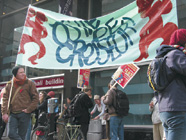Day of protest to restore student aid

Photo by Rommil Santiago
An estimated 350 Concordia students joined upwards of 100,000 others from Montreal colleges and universities yesterday to march through downtown streets.
The daylong strike at Concordia and open-ended strikes in several other institutions are an expression of anger at the Quebec government’s cutbacks in student aid, which were announced last fall. Student associations have kept up the pressure since then, demanding restoration of $103 million to the aid program.
Roughly 6,000 Concordia students depend on the government student aid program to help finance their studies. However, tuition for Quebecers remains the lowest in Canada at $1,862 a year, thanks to a longstanding tuition freeze.
Activities at the universities proceeded normally yesterday despite the strike. While it was difficult to gauge attendance in classes, traffic in the student services area was as busy as ever.
The daylong walkout was approved in a vote on March 9 on both campuses that was organized by the Concordia Student Union. To be valid, the strike vote needed 50 per cent plus one of 2.5 per cent of the eligible students. Out of a population of about 25,000 students, 768 voted for the walkout. There were objections from some students to what they saw as lack of representation.
Professors were asked by the administration not to penalize students who did not attend classes or write exams, or submit papers on March 16. Professors who cancelled their classes were expected to make them up.
David Frost, president of CUFA, said the full-time faculty association supported the aims of the student boycott and stood by the administration’s call for leniency for participating students. However, he said his colleagues are divided on the issues raised by the protest.
Maria Peluso, president of the part-time faculty union, said, “CUPFA supports the strike because we are committed to the principle of accessible public education for all. Our members are being given the option to cancel their classes if they can. We hope the students across Quebec are successful in having their voices heard.”
The day of protest is one of a series of activities stretching back to November, when 12,000 students took to the streets. Activists also conducted a campaign of telephone calls to the offices of members of the National Assembly.
Tim McSorley, chair of the Canadian Federation of Students-Quebec, said, “Forty per cent of students in Quebec are on financial aid, but the turnout shows that more than 40 per cent of students are concerned about it."